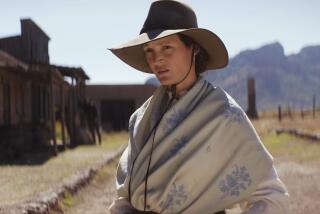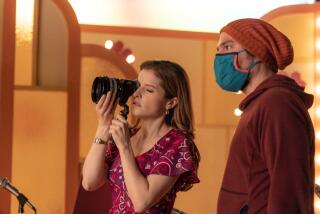‘News of the World,’ Paul Greengrass’ odd-couple western, is an admirable but bumpy ride
- Share via
The Times is committed to reviewing theatrical film releases during the COVID-19 pandemic. Because moviegoing carries risks during this time, we remind readers to follow health and safety guidelines as outlined by the Centers for Disease Control and Prevention and local health officials.
“We’re all hurting. These are difficult times.”
That’s Capt. Jefferson Kyle Kidd, a bearer of mostly bad tidings played with grizzled wit and warmth by Tom Hanks, and he isn’t exaggerating. A deadly epidemic has broken out. Racist violence is a daily scourge. A long and brutal national conflict has come to an end, but Texas, like many other Southern states, is none too keen to accept the outcome or its legislative implications. Some locals scowl in disbelief at the news that Kidd brings them, clinging stubbornly to their certainty that the future is theirs and theirs alone to determine.
Here it may be worth noting that “News of the World,” a sturdily mounted new western directed by Paul Greengrass, takes place in 1870, not 2020. The quaintness of what Kidd does for a living — traveling from one Texas town to the next, reading newspaper stories to large crowds — is one of the charms of the picture, and also the 2016 Paulette Jiles novel on which it’s based. But while his headlines may be disseminated by torchlight rather than by Twitter, the state of affairs they illuminate — a nation racked by sickness, death and bitter partisan squabbling — bears a canny resemblance to our own.
Perhaps this should come as little surprise from Greengrass, a British filmmaker who specializes in urgent dispatches from the here and now, and who has often subjected the myth of American exceptionalism to critical, dispassionate scrutiny. “News of the World,” his first foray into the dust, sweat and grime of pre-20th century period filmmaking, is an obvious dramatic and stylistic departure from his earlier work. Despite some signature camera rattlings — the road Kidd travels is a long and bumpy one — it feels more classically composed than the war movies, crisis thrillers and Jason Bourne capers that have made the director’s reputation as a maestro of mayhem.
But it is also not as far removed from his wheelhouse as it might look. Greengrass may have pushed the contemporary action movie to new levels of hyperkinetic abstraction, but he has always been something of a Hollywood classicist in vérité drag, with a knack for smuggling sharp political insights and documentary-inspired thriller techniques into squarely accessible dramatic packages. He may shun the tripod, but he is no stranger to clean narrative lines, strong, forthright emotions and all-American movie stars, as his previous collaboration with Hanks, “Captain Phillips” (2013), expertly demonstrated.
With its gorgeous wheat-toned landscapes and its salutary nods to pictures such as “The Searchers,” “True Grit” and “Paper Moon,” “News of the World” finds its maker navigating the conventions of the western and the road movie with relative ease. It helps that he has assembled a crew of typically top-drawer collaborators, among them the production designer David Crank, the costume designer Mark Bridges and, perhaps most impressive of all, the composer James Newton Howard, whose score is jangly, inventive and moving by turns. It also helps that, beneath its veneer of social-historical critique, the movie is built on the kind of slick, emotionally calculated two-hander premise that has your jugular plainly in its sights.
In the course of his travels, Kidd comes across a carriage accident and finds a 10-year-old girl (Helena Zengel) peeking out from the wreckage. Johanna, as she’s identified by her paperwork, has been abducted twice over: first by a Kiowa tribe that killed her immediate family years ago and raised her as their own, and again recently by local authorities who ostensibly rescued her. Now they’re trying to reunite her with her only known relatives, German immigrants who have settled in the southern Texas town of Castroville.
With a piercing blue-eyed stare that can seem recalcitrant and reproachful by turns, the gifted Zengel was clearly born to play screaming pint-sized misfits, as she did to searing effect in last year’s German drama “System Crasher.” Here, she does her utmost to turn a baggage-laden plot device into a human being, drawing on her own inner stillness and gravity to hint at losses and traumas that are both unspeakable and undepicted. The book’s most shocking disclosure about Johanna’s upbringing — that she has been taught how to scalp — has been carefully omitted, and not merely because the movie, one of just a few studio pictures charging into theaters over a COVID-19 holiday season, has at least a segment of the family audience in mind.
Like a few recent westerns, “News of the World” is an imperfect but sensitive attempt to confront, or at least sidestep, some of the reductive tropes and historically problematic representations of the genre. The plot may be rooted in off-screen acts of Kiowa barbarism, but the few Native American characters we meet tend to hover sadly on the margins, at one point intervening to our heroes’ benefit. The villains, without fail, are smug, self-entitled white men on horseback. The most shocking scene, showing the wholesale slaughter of prairie buffalo, lays bare the sickening cruelty of Manifest Destiny.
Johanna is a victim of the American legacy as much as anything, and her violent rejection of the settlers’ way of life — she speaks only the Kiowa language and tries to run away at every opportunity — carries its own moral implications. The only white man whose company she tolerates is Kidd, who comes to realize that the task of escorting Johanna to Castroville must fall to him and him alone. And so they set out on a nearly 400-mile journey, traveling south over rugged plains and craggy slopes shot with a majestically swooping camera by Dariusz Wolski. For the most part, though, that camera remains low to the ground, bump-bump-bumping alongside Kidd and Johanna, nudging this odd couple along that crowd-pleasing road from incongruous to inseparable.
Along the way, they’ll get unexpected help and unexpected trouble, cueing the movie’s fine supporting actors to step in for a memorable scene or two. Elizabeth Marvel plays a kindly innkeeper whose name, Mrs. Gannett, may or may not be a nod to the media empire that will one day supplant Kidd’s chosen profession. Bill Camp shows up, which is never a bad thing. As a human trafficker, Michael Angelo Covino sets in motion the movie’s most sustained action sequence, one that finds Greengrass’ chops in terrific form even without his usual recourse to high-speed vehicles and broken glass.
For snarling villainy, Covino is matched only by Thomas Francis Murphy as Merritt Farley, a wealthy scoundrel who owns and dominates a lucrative stretch of Texas buffalo country. Farley makes the mistake of trying to exploit our hero’s work, to channel his news-reading talents in service of an oppressive, propagandistic agenda. He clearly has no idea who he’s up against, by which I don’t mean just Capt. Kidd. If there is an actor better equipped than Tom Hanks to stand up in front of a crowd desperate for hope, truth and decency, he doesn’t come to mind. By this point in his career, the 64-year-old Hanks may well be tired of being likened to Jimmy Stewart or Gary Cooper, but to see him here, as a man of the west and a font of moral courage, is to understand why the comparisons keep sticking.
Now as ever, he has a rare gift for making simple decency look compelling. He also illuminates Kidd’s other dimensions: a war veteran’s scars, a widower’s grief, a storyteller’s pride and delight in his craft. Poring over the yellowing newspapers in his portfolio, Kidd is never simply reading the news; he’s also reading his audience and curating his stories accordingly. He is a teacher and an entertainer, a provider of diversion as well as information. And when he breaks down the latest news from the North — explaining, for instance, the 15th Amendment and its extension of voting rights to Americans of any race — he becomes something more, a champion of literacy, liberty and social progress. He is an emissary of the future in towns that would prefer to stay locked in the past.
Greengrass can be as shrewd and skillful a storyteller as his hero, even if “News of the World” finally inspires something less than total belief. Tough as it is not to be moved by Zengel’s performance and her rapport with Hanks, it is somehow equally hard to look past the obviousness of her narrative function, to see Johanna as a full-fledged character rather than a conveniently tragic, conveniently redemptive pawn. At times her gaze, a sharp rebuke to anyone who would attempt to tame or control her, can’t help but feel like directed at the movie itself. “News of the World” may want better for her than the various losers and abusers who cross her and Kidd’s path, but it, too, sees her primarily as a problem to be solved, a thing to be controlled, a means to an end.
‘News of the World’
Rated: PG-13, for violence, disturbing images, thematic material and some language
Running time: 1 hour, 58 minutes
Playing: Starts Dec. 25 at Mission Tiki Drive-In, Montclair, and in general release where theaters are open
More to Read
Only good movies
Get the Indie Focus newsletter, Mark Olsen's weekly guide to the world of cinema.
You may occasionally receive promotional content from the Los Angeles Times.










